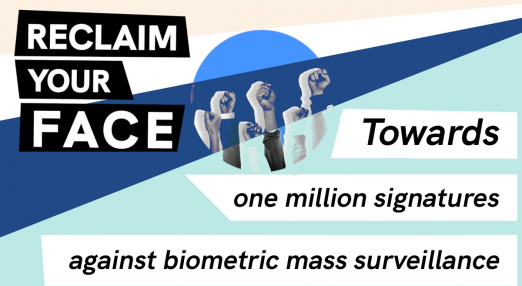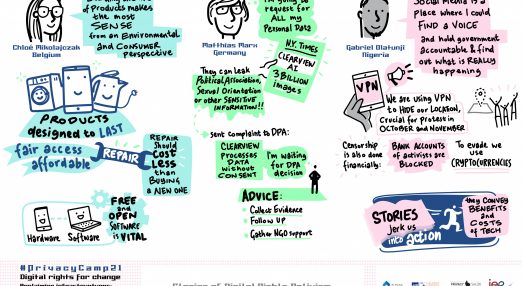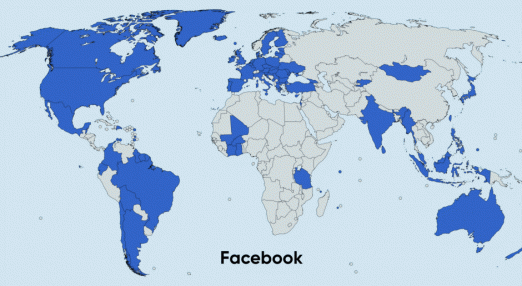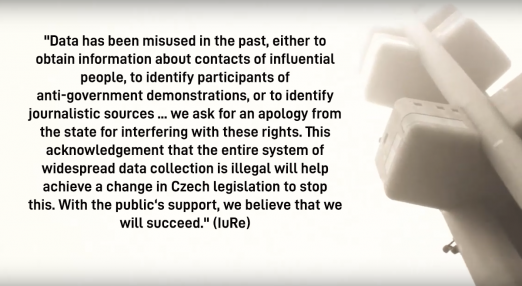Our work
EDRi is the biggest European network defending rights and freedoms online. We work to to challenge private and state actors who abuse their power to control or manipulate the public. We do so by advocating for robust and enforced laws, informing and mobilising people, promoting a healthy and accountable technology market, and building a movement of organisations and individuals committed to digital rights and freedoms in a connected world.
Filter resources
-

Call for Nomination: EDRi Board elections 2021
EDRi is looking for interested candidates to become a member of the EDRi Board. As an EDRi Board Member, you will help shape the future of the organisation and the network and advance our mission to promote and protect human rights in the digital environment. You will have a responsibility as an employer of the EDRi office and vis-à-vis the members.
Read more
-

The Dating App “Grindr” to be fined almost € 10 Mio
On 26 January, the Norwegian Data Protection Authority upheld the complaints, confirming that Grindr did not recive valid consent from users in an advance notification. The Authority imposes a fine of 100 Mio NOK (€ 9.63 Mio or $ 11.69 Mio) on Grindr. An enormous fine, as Grindr only reported a profit of $ 31 Mio in 2019 - a third of which is now gone. EDRi member noyb assisted with writing the legal analysis and formal complaints.
Read more
-

ReclaimYourFace activates the public and civil society to ban biometric mass surveillance
The EDRi network and partners launched the first phase of the Reclaim Your Face campaign, which focuses on raising awareness and investigating and challenging abusive uses of facial recognition and other biometric tech at a local and national level, in November 2020. The coalition has achieved several wins in the two months since. However much remains to be done in the movement to reclaim our faces and ban biometric mass surveillance in Europe!
Read more
-

What went down at #PrivacyCamp21?
EDRi’s annual flagship event Privacy Camp took place yesterday, on 26 January, for the first time online. We hope many of you were able to attend and that you found the event just as inspirational as the in-person experience.
Read more
-

La Quadrature du Net asks for renewed support to challenge TERREG in France
In light of the European Parliament's vote on the Regulation to prevent the dissemination of said “terrorist content”, EDRi observer La Quadrature du Net (LQDN) sheds light on some of the most concerning provisions which have to be addressed before the final adoption of the regulation.
Read more
-

The pros and cons of moving to e-IDs
EDRi member Epicenter.works give their position on electronic identity (e-ID) in light of the continues work on e-ID in Austria. They share that as convenient as the e-ID may seem and as much it is being communicated as the logical evolution of the classic ID, caution must be exercised when it comes to creating, storing and accessing sensitive identity data. Utmost caution is required when the private sector and the state use shared infrastructures for this purpose.
Read more
-

EDRi-gram, 27 January 2021
We hope many of you were able to join us at Privacy Camp 2021 yesterday which brought together 245 academics, activists and privacy experts from across the world. Stay tuned for the key takeaways. In this edition of the EDRi-gram we showcase the mobilisation efforts and victories so far from the #ReclaimYourFace campaign, share Privacy International's research on political ads and much more.
Read more
-

Online political ads – a study of inequality in transparency standards
In its new report, EDRi member PI looks into the implementation of transparency tools by Facebook, Google and Twitter in relation to political advertising. This work was produced in collaboration with partner organisations InternetLab and ELSAM.
Read more
-

Data retention concerns resurfaces in Norway
EDRi member, EFN expresses serious concerns regarding the changes to the Norwegian Electronic Communications Act proposed by the Norwegian government.
Read more
-

Member in the Spotlight: Alternatif Bilişim Derneği
The Alternative Informatics Association (Turkish: Alternatif Bilişim Derneği, Alternatif Bilişim acronym) is a Turkey based civil society organisation focusing on the issues of media literacy, internet censorship and mass surveillance since 31 December 2010.
Read more
-

When the police’s IT-systems are not in order, everyone loses
Without the trust of citizens, the police cannot do their job properly. That is why it is important that the police are extremely careful with citizens' data. But an analysis by EDRi member Bits of Freedom shows that of all 36 'mission critical' systems of the police, not one complies with the rules on privacy and information security.
Read more
-

IuRe crowdfunds to end data retention in the Czech Republic
The digital-legal organisation, EDRi member, Iuridicum Remedium is crowdfunding to take the Czech government to court to end the widespread collection of metadata from telephone and online communication of every user in the country (so-called data retention). The case willrely on a ruling by the EU Court of Justice, which declared that the large-scale collection of metadata was inadmissible, for the third time last October. Crowdfunding a legal case in the public‘s interest is an alternative to dysfunctional class actions.
Read more
